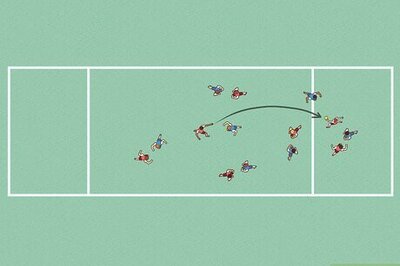
views
- Listen closely and take detailed notes during math class. If you have any questions, raise your hand or talk to your teacher after class.
- Before doing homework, review your class notes to solidify the information. Complete your homework on time so you'll be ready for the next class.
- Start studying for an upcoming exam 3-4 days in advance. Plan to study for about 60 minutes each day so you're fully prepared.
Brush up on basic math concepts.

Math can be a difficult subject, especially if you don’t understand some of the core concepts. More advanced mathematical ideas build on more basic ones, so it is not a bad idea to review concepts and ideas that are a little fuzzy, until they become perfectly clear. For example, brush up on Addition, subtraction, multiplication, and division. These are crucial parts of math, and having a firm grasp on them will help you out in more advanced fields of math, including algebra and trigonometry.
Attend every math class.

It’s tough to get better at math if you skip classes. You’ll miss out on valuable instruction if you’re absent, and your math skills remain stagnant. Math skills and concepts are cumulative, meaning that what you learn during week 5 of the semester will build on what you learned during week 4. But, if you skipped classes during week 4, you’ll almost certainly struggle to pick up the concepts taught in future weeks. If you must miss a class (e.g., if you’re sick), email your teacher and ask what information you missed. Politely ask them if you can make up in-class assignments you missed.
Listen closely during class .

Focusing and paying attention to your teacher can help you get better faster. Write down any problems, equations, or figures that the instructor draws on the board. These will be valuable to refer back to if you get stumped while working on math homework outside of class. If you typically sit with a group of friends who whisper or text during class and distract you from what the teacher is saying, move away from them and sit alone near the front of the room.
Take notes during class.

As the teacher speaks, jot down detailed notes in your best handwriting. It’s very likely that what the teacher is saying is important and is something you should remember that will help you study for tests. Writing down what your instructor is saying will help you understand the ideas, and the notes you take will also be a valuable resource when you’re studying for a test or quiz. You can take notes either on paper or in a word-processing document on your computer. However, if you have a tendency to get distracted on the internet while you’re taking notes with a computer, stick to taking notes on paper.
Ask your math teacher for help if you’re struggling.

If you're confused about something, talk to your teacher. Raise your hand during class and ask a question, or visit your teacher after class with a specific problem. In reality, you're probably not the only one confused, and other students will appreciate your question too. For example, you could say something like, “I’m really struggling with understanding imaginary numbers, and I’ve read the textbook chapter a few times. Could you explain them to me again?”
Remove all distractions.

Make your studying environment as distraction-free as possible. Put the cell phone aside and turn off the TV. Don’t have anything other than your textbook and a calculator on your desk, as you might be tempted to play with the object and lose concentration. If studying with friends distracts you from your work, plan to do your math work alone. If it helps, you could set a timer (say, for 1 hour) and aim to concentrate on the work before you in the time you’ve set aside for it. There will plenty of time for the other things later.
Read through the notes you took during class.

Take 10 to 15 minutes to re-read the notes you took during the previous math lecture. Your detailed notes won’t do you much good if you never refer back to them! When you sit down to do your homework or solve a few math problems, look over what you jotted down. This will keep the steps you’ll use to solve an equation or calculate a variable fresh in your mind and prevent any potential misunderstandings. If you’re confused by your notes or can’t read your own handwriting, try re-reading the chapter of your math textbook that you’re currently working through. Doing this will help you to understand the mathematical topics you’re currently working on.
Complete every problem on your assignments.

Instead of viewing homework as an obligation, look at it as a way to improve your skills. To that end, make sure that you do 100% of the problems on each assignment you’re given. If you’re not quite sure how to do an assigned problem or feel like it’s over your head, speak to your teacher after class and ask for their help. If you’d rather not ask the teacher, you could also ask one of your peers or friends how to solve a tricky problem.
Work additional problems on your own.

Once you've finished your homework, try doing a few more questions. After completing 3 to 5 extra problems, check your answers against those given in the back of the book. If one of your answers is incorrect, check your work and find where you slipped up. Working extra problems is a great way to improve your math skills! Let’s say you’re studying geometry and are having a hard time rotating and reflecting shapes around axes. Work a few problems that deal with this issue. Start with easy problems and work your way to more difficult ones to help yourself master the issue. EXPERT TIP Joseph Meyer Joseph Meyer Math Teacher Joseph Meyer is a High School Math Teacher based in Pittsburgh, Pennsylvania. He is an educator at City Charter High School, where he has been teaching for over 7 years. Joseph is also the founder of Sandbox Math, an online learning community dedicated to helping students succeed in Algebra. His site is set apart by its focus on fostering genuine comprehension through step-by-step understanding (instead of just getting the correct final answer), enabling learners to identify and overcome misunderstandings and confidently take on any test they face. He received his MA in Physics from Case Western Reserve University and his BA in Physics from Baldwin Wallace University. Joseph Meyer Joseph Meyer Math Teacher Hone your mental math skills. Improve your math muscle memory by solving problems without using calculators, paper, or counting aids. Use your mind, memory, lessons, and discussions with your classmates to refine your math skills and improve your problem-solving abilities.
Break down tough problems into smaller parts.

Master difficult math concepts by making them seem manageable. Even the most complex math equations are made up of many small, not particularly difficult component steps. Once you figure out what those steps are and how to solve them individually, you’ll be well on your way to correctly solving the larger problem. For example, say you’re working on a complicated algebra problem that involves dividing 1 variable-filled equation by another. First solve each of the equations above and below the division line, and only then move on to tackling the division.
Figure out why you missed the problems that you solved incorrectly.

A great way to improve at math is to learn from your own mistakes. This way, you can improve in the specific areas that you’re weakest in. After each quiz or test is returned to you, take a look at the problems you missed and review your steps to find out where you went wrong. Then, the next time you come across this kind of problem, you can solve it correctly! For example, maybe you followed the order of operations incorrectly and forgot to solve equations within parentheses first. Do this with your homework, too! Review each assignment after it’s passed back to you and figure out where you went wrong on the problems that you missed.
Explain tricky concepts to your peers.

Teaching a concept to others is a great way to improve your own understanding. You’ll be forced to put your math knowledge into words and figure out ways to break large, complicated ideas into smaller, bite-sized bits of knowledge. If you get stuck trying to explain something, refer back to the textbook or ask your teacher for help. Say that a friend from your math class is struggling to understand how to use the quadratic equation. Explain it to them as best you can, and solve a couple of problems with them to make sure you both get it.
Apply math concepts to real-world issues.

Turn your math problems into something relatable. Math can sometimes feel a little abstract and seem like it doesn’t tie into the real world. This doesn’t need to be the case, though. Help yourself get better at math by finding ways to tie what you’re learning in with your real life. For example, the Pythagorean Theorem has to do with the ways that shapes of different sizes relate to one another. As another example, think of negative numbers. While they may seem irrelevant when you’re first learning about them, negative numbers are useful in thinking through ideas like financial debt, which is a concept you should understand. The mathematical constant “e” also has real-life tie-ins and it can help you understand mathematical growing processes. Ask your teacher to help you come up with some additional ways that you can apply math to real-world issues.
Work with a tutor.

If you’re still struggling with math, it might be worth asking a tutor for help. One-on-one learning is often beneficial, since the tutor can answer all of your questions and tailor their teaching style to your learning style. The tutor can also explain concepts in ways that make sense to you, and can give you helpful advice to make learning math easier. A lot of colleges and private high schools offer free math tutoring on the campus. Talk with the admin assistant in the math department or with your teacher or to get connected with a tutor.
Study for tests in advance.

Start preparing for exams 3 to 4 days ahead of time. When your teacher says a test is coming up, avoid cramming the night before. Plan to study for about 60 minutes each day to brush up for the test. Re-read the book chapters you’ll be tested on and look over your relevant in-class notes to see what mistakes to avoid. If you have time, you could even test yourself with flash cards or form an impromptu study group with your friends. If you find that you’ve forgotten some of the math lessons or are still struggling with a tricky concept, ask for help! The teacher will appreciate your earnestness and won’t mind answering your questions.
Study in a group of peers.

Study groups are a great way to prepare for a test and improve your math abilities. They let you and your peers ask each other questions about topics that confuse you and review material that’s going to appear on an upcoming test or exam. Try studying with flash cards, or working difficult problems together. Keep focused during group study time! If it turns into a social hour, your math skills won’t get any stronger. If people start joking around or lose focus, say something like, “Hey guys, I’m glad we’re having a good time, but let’s keep focused on the math we came here to study.”
Stay calm and focused during tests.

Feeling anxious during a test could lower your overall score. So, take a deep breath before you go into the classroom to stay calm. If you feel yourself tensing up during the test, stand up, stretch your legs, and take a 2–3 minute break to calm down. Also make sure you get a good night’s sleep and eat a full, healthy meal before going in for a math test.















Comments
0 comment